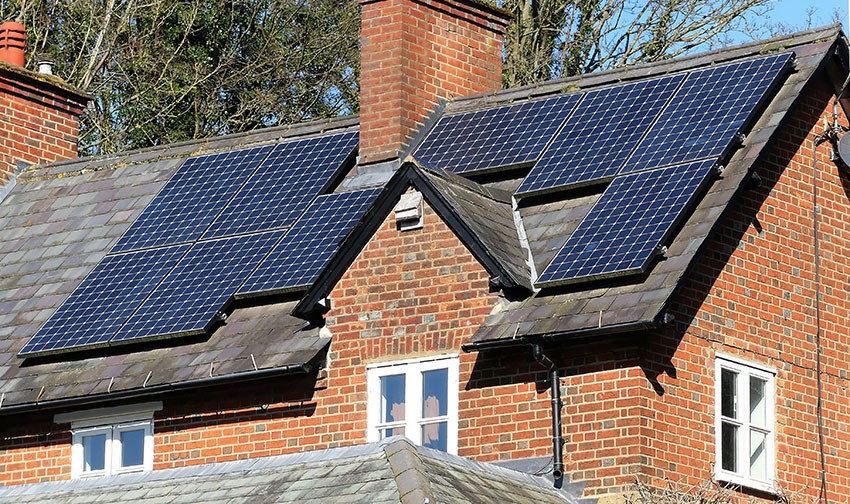
As energy prices continue to soar across the UK, now more than ever, more of us are turning to renewable solutions when it comes to generating electricity.
According to industry figures, solar panel installations increased by 70% in 2021 as more than 60,000 homes had them fitted.
But just how do solar panels save you money? And how can you maximise their potential? Find out exactly how you can cut the cost of your energy bills in our latest blog post below.
How Do Solar Panels Work?
Solar panels are made from photovoltaic (PV) cells which convert the sun’s energy into electricity.
Solar panels generate a direct current (DC) of electricity which is then passed through an inverter and converted into an alternating current (AC) which can be used to power general household appliances or fed through the National Grid.
Luckily for those of us who live in the UK, a great benefit of solar panels is that they don’t require extraordinary amounts of sunshine to work. Positioned correctly, solar panels will still generate up to 60% of their regular output, even on a cloudy day.
For those truly looking to live sustainably and move towards self-sufficient energy, solar panels can easily be combined with other renewable solutions such as air source heat pumps, working to power your heating as well as electricity and saving you money in more ways than one!
How Can Solar Panels Help Save on Electricity Costs?
Aside from doing your bit to help the environment by reducing your carbon footprint, one of the biggest benefits of solar panels is that they can cut your electricity costs by up to £330 a year.
The way this works is simple – By using solar energy, you reduce your reliance on the National Grid and instead, generate a cheaper and cleaner form of energy which isn’t subject to spiralling costs.
You don’t need to worry about generating enough electricity all at once either; with the addition of a solar battery, you can store excess energy which can be used during times of lower generation and can even power your home at night.
What’s more, solar energy can be used alongside a normal energy tariff, meaning that even with a hybrid approach, you’ll still be using less energy from the Grid and therefore, saving money on your electricity bills.
For an estimate on how much you could save, take a look at The Energy Saving Trust’s solar energy calculator.
Can I Earn Money From Solar Panels?
If you install solar PV panels or other eligible renewable electricity generation in your home or business, you may be eligible to earn money through the Government’s Smart Export Guarantee (SEG) scheme.
Launched in 2020, the initiative requires that some electricity suppliers pay small-scale generators such as homeowners for low-carbon electricity which they export back to the National Grid.
Anyone who has invested in the following renewable technologies in Great Britain could benefit from the SEG scheme (provided they meet the rest of the criteria)
- Solar Photovoltaic (Solar PV)
- Wind
- Micro combined heat and power (micro-CHP)
- Hydro
- Anaerobic digestion (AD)
How much you could earn from the SEG scheme varies considerably: energy companies set their own tariff prices, so be sure to shop around to make sure you get the best prices.
Is My Home Suitable for Solar Panels?
Whilst solar panels don’t need much beyond natural light to work effectively, you should still check that your home meets the following requirements to ensure it is suitable for solar PV.
You’ll need a predominantly south-facing roof for maximum efficiency
While it’s true that solar panels work best on any south-facing roof, a solar PV system installed on roofs which are East or West facing will still operate at 85% efficiency and will still generate a significant amount of electricity throughout the day. It is best to avoid North-facing roofs as you’re unlikely to get any benefit.
You’ll need enough space
Solar panels typically take up two square metres each, so for optimum surface area, it’s important that your roof has enough space for multiple solar panels (between 8-12). You can install solar panels on walls and even on the ground, so if your roof is too small, there are other options to consider.
Your roof should get enough sunlight
Although direct sunlight isn’t necessary all the time, during the peak period for daylight (between 10am-4pm) your solar panels should ideally be unshaded.
Your roof should be in good condition
Be sure to have a professional inspection carried out before installing solar panels to check for any damage. If you have old tiles, it may be worth getting them replaced before your solar panels are installed to avoid problems with installation or issues later on down the line.
Your roof should ideally be diagonal to absorb the most sunlight
Although not essential, installing solar panels on a diagonal roof works best for catching the suns rays. Whilst you are still able to install a solar PV system on a flat roof, you will likely need to purchase a tilted mounting system to help the solar panels self-clean in the rain and to prevent them from pooling water and causing water damage.
You can read more frequently asked questions on solar panels here.
With virtually no maintenance required, the biggest cost when it comes to solar panels is upon initial installation. After this, the potential to save money and generate profit makes investing in renewable solar power the best choice for a sustainable future.
Solar Panel Installation With Go Green Solar
If you’re looking to save money on your electricity bills and start your journey with solar energy, we can help!
To arrange a free site visit, or to find out more about solar PV, call us on 0117 964 0078 or request a free quote using our online form today.